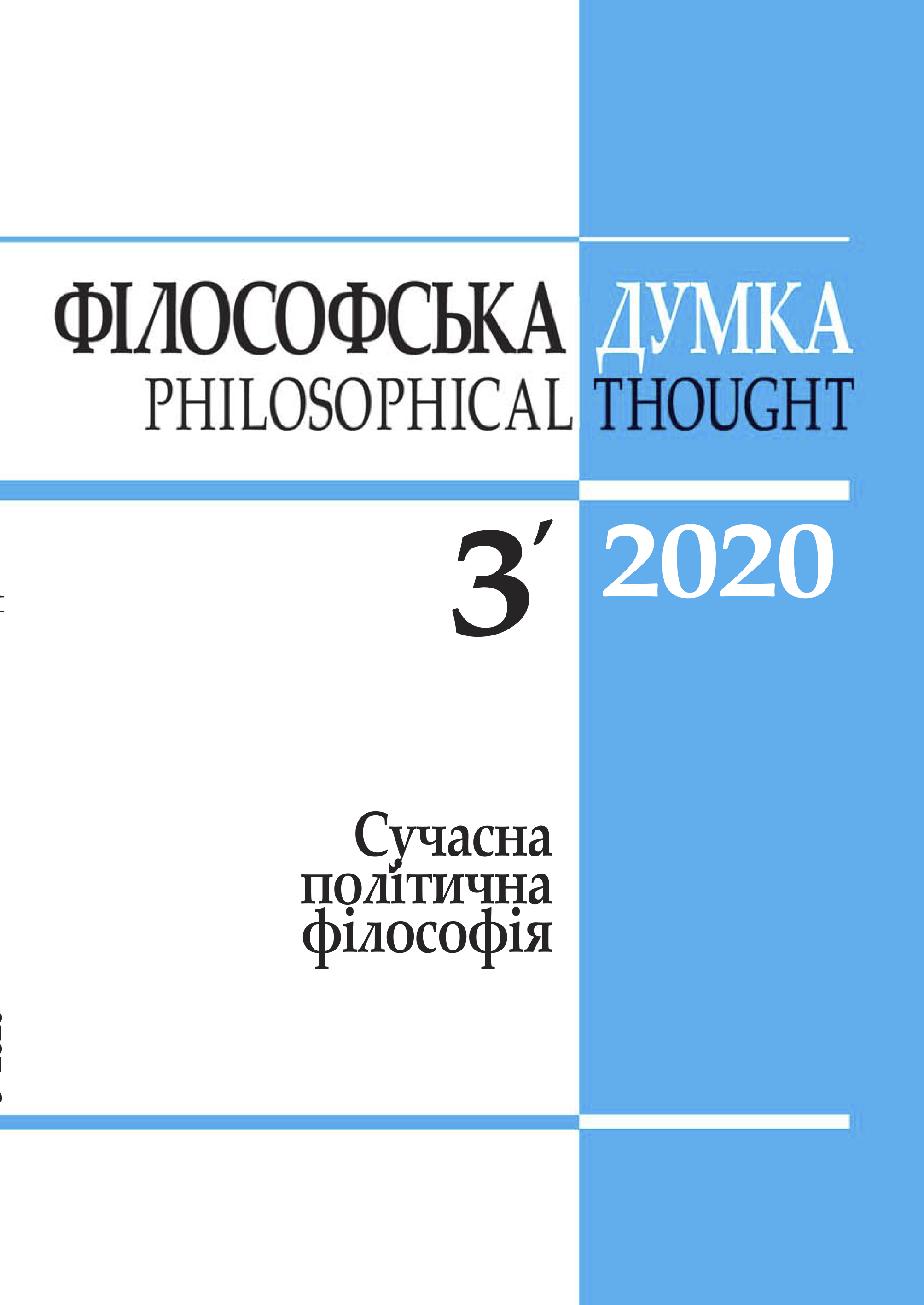Communicative equality and the politics of disagreement
Current issues of modern political philosophy and ethno-national studies
DOI:
https://doi.org/10.15407/fd2020.03.038Keywords:
communication, communicative equality, understanding, disagreement, social inequality, politics, politics of aestheticsAbstract
The author develops the concept of communicative equality based on Habermas’ theory of communicative action aimed at understanding. Linguistic interaction presupposes communicative equality as a priori condition of mutual understanding. It raises the critical issue of a role and place of misunderstanding and disagreement that we can meet in everyday communication. Following Rancir’s examination of disagreement the author is tracing sensible perception of social inequality by a part of communicators, as well as the emergence of political disagreement as its consequence. The main part of the article devotes to realization of a conflict produced by speaking beings’ equality and experiencing inequality of distribution of parts of the common good. The author analyses Rancir’s innovative interpretation of concepts of politics, the politics of aesthetics, the police, the wrong, and new reading Aristotle’s and Plato’s notion of blaberon. The double logic of communication as both equality in mutual understanding and as the class struggle for social equality is shown, followed Ranciеr, on the example of historian and philoso- pher Ballanche, who in the early 19th century direct compared events of the French Revolution and the secession of Roman plebeians on Aventine Hill. The critics of Habermas’ theory of discursive rationality occupy the particular place of the article. His model of communication rejects an active role of the third person, i.e., the observer’s position in communicative actions oriented towards understanding. But addressing to other historical example of both the theorist-observer and one of Ukrainian revolution 1917–1921 leaders, writer Volodymyr Vynnychenko assists to clarify the meaning of “the third person” in communicative formation of a new political and cultural community. Finally, referring to Schmitt’s concept of the political as the existential conflict of recognition or negation of an opponent’s way of existence allows for a conclusion that studying existential dimension of communication can add to analysis of communication.
References
Apel, K.-O. (2012). The A Priory Foundation of Communication and the Foundation of the Humanities. In: Philosophy of Communication / Ed. by B.G. Chang, G.C. Butchart. Cam- bridge, MA, London: The MIT Press.
Aristotle (2000). Politics / Tr. O. Kisliuk. [In Ukrainian]. Kyiv: Osnovy.
Carpenter, E., McLuhan, M. (1960). Introduction. In: Exploration in Communication / Ed. By E. Carpenter, M. McLuhan. Boston: Beacon Press.
Gadamer, H.-G. (2000). Truth and method. Foundation of philosophical hermeneutics / Tr. O. Mokrovolskyi (vol. 1). [In Ukrainian]. Kyiv: Univers. Habermas, J. (1989). The Theory of Communicative Action. Vol.1. Lifeworld and System: a Critic of Functionalist Reason / Tr. by Th. McCarthy. Boston: Beacon Press.
Habermas, J. (1995a). The Philosophical Discourse of Modernity. Twelve Lectures / Tr. by F.G. Lawrence. Cambridge, MA: The MIT Press.
Habermas, J. (1995b). Truth and Justification / Tr. by Barbara Fultner. Cambridge: MIT, Polity
Press.
Habermas, J. (1998). Between Facts and Norms. Contribution to a Discourse Theory of Law and Democracy. Tr. by William Rehg. The MIT Press, Cambridge, Massachusetts.
Habermas, J. (2014). Between Naturalism and Religion. Tr. by Ciaron Cronin. Polity Press. Cambridge.
Habermas, J. (2018). Philosophical Introductions. Five Approaches to Communicative Reason / Tr. by C. Cronin. Cambridge: Polity Press.
Hyrych, I. (s.a.). Setting the Record Straight: Reconceptualization of the Ukrainian Revolution. Historian, M.S. Hrushevsky Institute of Ukrainian Archeography and Source Studies. Retrieved from: https://www.istpravda.com.ua/eng/articles/2018/09/28/153033/
Kasianov, G. (2015). Ukraine between Revolution, Independence, and Foreign Dominance. In: The Emergence of Ukraine. Self-Determination, Occupation. And War in Ukraine, 1917-1922 by Wolfram Dornik, Georgiy Kasianov, Hannes Leidinger, Peter Lieb, Alexei Miller, Bohdan Musial, Vasyl Rasevych / Tr. by G. Fagan. Edmonton, Toronto: Canadian Institute of Ukrainian Studies Press.
Panagia, D. (2006). The Poetics of Political Thinking. Durham, London: Duke University Press.
https://doi.org/10.1215/9780822387909
Plato (1990). Cratylus / Tr. T.V. Vasilieva. In: Collection of works in four volumes (vol. 1). Moscow: Mysl.
Ranci r, J. (1999). Disagreement. Politics and Philosophy / Tr. by J. Rose. Minneapolis, London: University of Minnesota Press.
Ranciеr, J. (2012). The Politics of Aesthetics. The Distribution of the Sensible / Tr. by G. Rockhill. S.l.: Continium.
Salkever, S. (2005). Aristotle's Social Science. In: R. Kraut, S. Skultety, Aristotle's Politics: critical essays. S.l.: Lanham, Rowman & Littlefield Publishers.
Schmitt, K. (2007). The Concept of the Political / Tr. by G. Schwab. S.l.: The University of Chicago.
https://doi.org/10.7208/chicago/9780226738840.001.0001
Schutz, A., Lukman, T. (2004). Structures of life / Tr. V. Kebuladze. [In Ukrainian]. Kyiv: Ukrainian Center for Spiritual Culture.
Titus Livius (1989). History of Rome from the foundation of the city / Tr. N.A. Pozdniakova (vol. 1, ch. 32). [In Russian]. Moscow: Nauka. Retrieved from: http://ancientrome.ru/antlitr/t.htm?a=1364000232
Vynnychenko, V. (1920). Revival of the nation (part 1). [In Ukrainian]. Kyiv, Vienna: Dzvin.
Downloads
-
PDF (Українська)
Downloads: 514
Published
How to Cite
Issue
Section
License
Authors who publish with this journal agree to the following terms:
- Authors retain copyright and grant the journal right of first publication.
- Authors are able to enter into separate, additional contractual arrangements for the non-exclusive distribution of the journal's published version of the work (e.g., post it to an institutional repository or publish it in a book), with an acknowledgement of its initial publication in this journal.
- Authors are permitted and encouraged to post their work online (e.g., in institutional repositories or on their website) prior to and during the submission process, as it can lead to productive exchanges, as well as earlier and greater citation of published work (See The Effect of Open Access).


